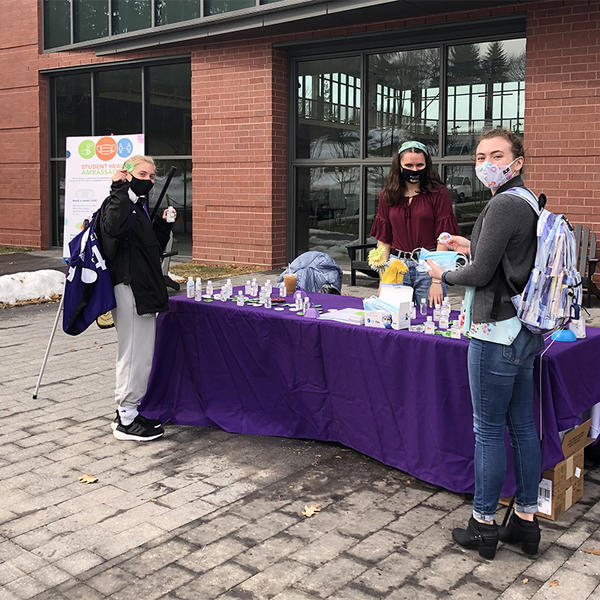A playlist of pop and dance songs, from Nick Jonas to Britney Spears, reverberated through the speaker on a table outside "The Jo," as the Joanne Chouinard-Luth Recreation and Wellness Center is known. It was the second week of March, and as students queued up for their twice-weekly required COVID-19 tests, several of their peers staffed that table representing the Student Health Ambassadors group. They handed out masks and hand sanitizer, raffled off a Fitbit and kept the playlist upbeat.
"The Student Health Ambassadors are a new group that we formed this semester," says Liz Drexler-Hines, the College's director of wellness programming. "Their primary emphasis is to engage and educate their fellow students around COVID guidelines. And they act as role models, because we know from public health theory that peer education is an effective tool on college campuses and among young adults to positively change behavior."
There are more than 60 Student Health Ambassadors (SHAs), representing a diverse cross-section of the student body and all class years. Some have returned to campus for the semester; others got involved even while engaged in remote learning from home. Hui Li '21, a classics and psychology double major, is taking classes from her home in Boston, where she creates informative graphics for social media and flyers as part of the group's marketing subcommittee. On campus, the SHAs wear masks and buttons with their logo, so other students know they can approach them with questions.
"We put the call out to all students. It's an incredibly diverse group: some are athletes, some are student leaders," Drexler-Hines says. "Some are just really passionate about this, some are personally affected by COVID… there's lots of different reasons why students joined."
SHA Benjamin Grant '21, a psychology major on the pre-med track in the Health Professions Advising program, had already participated in one of the College's health peer education groups before the pandemic, and got involved to "play an active role in keeping us on campus," he says.
The Student Health Ambassadors role is not to report violations or punish students — rather, they keep their peers informed of campus policies and guidelines and help them navigate social situations during this unique semester.
"We did a training on consent and boundary setting in the context of COVID," Drexler-Hines says. "If a friend or roommate is being a little riskier than what you both decided upon or your comfort level, how do you navigate that?"
The group has also been trained on unconscious bias by the College's Office of Multicultural Education, a session that ambassador Allison McGrath '22, a biology major and Russian studies minor on the pre-dental track in the Health Professions Advising program, has utilized.
"It's easy to see someone not wearing a mask, for example, and the picture you can paint about why they might be choosing to break a rule. But we've been trained to interact with them in a way that is nonconfrontational and helps create a healthy environment and relationship between the Student Health Ambassadors and the rest of the school population. If you tell someone to put their mask on in a judgmental way, they're a lot less likely to do it than if you ask if they know the kind of protection they would have if they choose to put the mask on, and then you let them make that decision for themselves."
McGrath wants her fellow students to know: "We’re a good resource to bounce ideas off of and we're people that can help you find an answer to a question or navigate the situation you are in."
The Student Health Ambassadors are one of multiple peer education groups supported by Drexler-Hines' Student Wellness Education office, which offers events and workshops on mindfulness, meditation, sleep strategies, healthy relationships and substance awareness, plus substance-free evening and weekend programming and a community for students in substance recovery. While the original purpose of the Student Wellness Education office was substance abuse prevention, its role has greatly expanded in recent years, under Drexler-Hines' leadership and with the support of the student affairs division. Not only are they responding to the needs created by the pandemic, with the creation of the Student Health Ambassadors, but they are also striving to support students fully, in their mind, body and spirit.
"We are working to grow this holistic model and incorporate more and more beyond just substance use prevention," Drexler-Hines says. "It's cura personalis ['care for the whole person'] and the Ignatian spirit of making sure we’re taking care of ourselves so we can care for others."
New Student Health Ambassadors Group Provides Peer-to-Peer Resources

Students step up to serve their community through the College's Student Wellness Education Office
Read Time
3 Minutes


